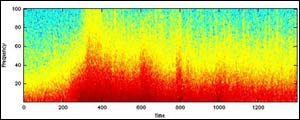In Jules Verne’s nineteenth century classic Journey to the Centre of the Earth, an Edinburgh professor and colleagues follow an explorer’s trail down an extinct volcano to the Earth’s core. Ah, fantasy! Here’s reality: For more than a century after Verne wrote his novel, geophysicists have had only one tool with which to peer into our planet’s heart-seismology, or analysis of vibrations produced by earthquakes and sensed by thousands of instrument stations worldwide. But now, geophysicists have
Hurricane Emily’s 140-mile-per-hour winds, which last week blew roofs off hotels and flattened trees throughout the Caribbean, owed their force to an unlikely culprit – ocean spray.
According to a new study by two University of California, Berkeley, mathematicians and their Russian colleague, the water droplets kicked up by rough seas serve to lubricate the swirling winds of hurricanes and cyclones, letting them build to speeds approaching 200 miles per hour. Without the l
Colwellia psychrerythraea 34H reveals its subzero secrets
At home in the deep, dark Arctic Ocean, the marine bacterium Colwellia psychrerythraea 34H keeps very cool–typically below 5° degrees Celsius. How does the bacterium function in this frigid environment? To find out, scientists at The Institute for Genomic Research (TIGR) and collaborators have sequenced and analyzed C. psychrerythraea’s genome.
That genome analysis, posted in the Proceedings of the National Acad
Tracing the larvae of marine organisms from where they were born to their ultimate destination has been regarded as one of the greatest challenges in ocean science. Managers of marine reserves areas have eagerly sought this information to help determine the optimal size and spacing of marine reserves; well-planned reserves should help ensure that protected populations can sustain themselves as well as provide a source of larvae to maintain exploited populations in areas open to fishing. In a
Ship strikes and entanglement in fishing gear are threatening the survival of the North Atlantic right whale, one of the most endangered whales with an estimated population of about 350. With eight recorded deaths in the past 16 months and a population growth rate that has declined since 1980, scientists say that unless emergency management actions are taken the population will face a catastrophic decline and become extinct.
A report in the July 22 issue of the journal Science say

Researchers Track Underwater Noise Generated by December 26 Earthquake
When the sea floor off the coast of Sumatra split on the morning of December 26, 2004, it took days to measure the full extent of the rupture. Recently, researchers at Columbia University’s Lamont-Doherty Earth Observatory analyzed recordings of the underwater sound produced by the magnitude 9.3 earthquake. Their unique approach enabled them to track the rupture as it moved along the Sumatra-Andaman Fault,